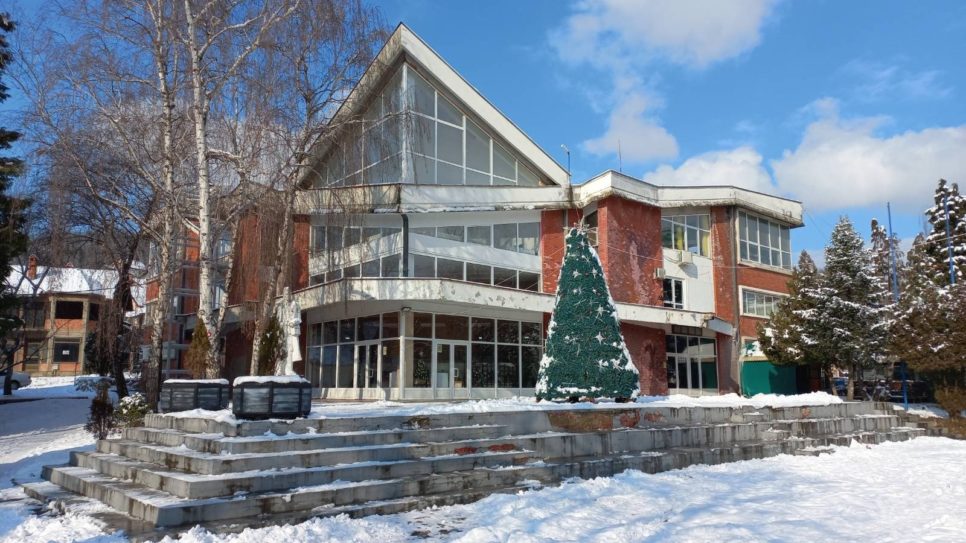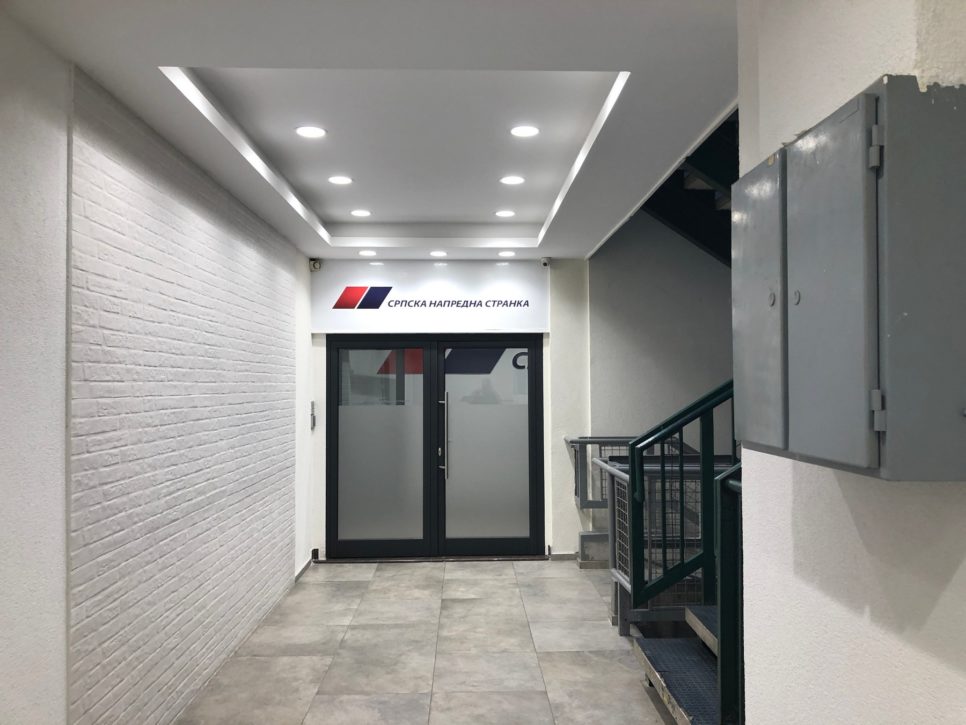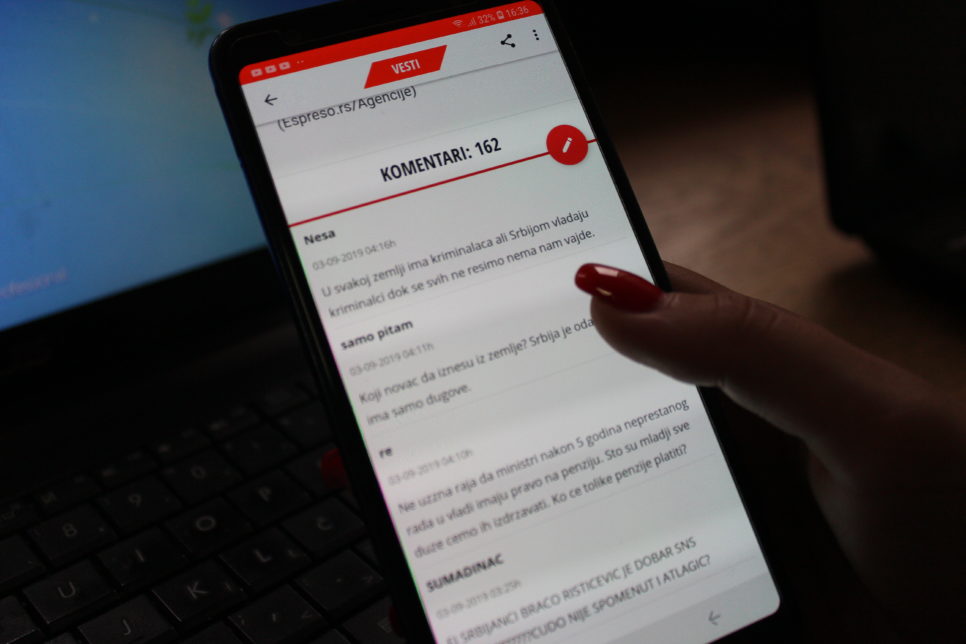It all starts with a text message.
In order to even start working at the call center, someone needs to recommend you. That is why CINS’s journalist, in order to be recommended, sent a text message with her name, surname, and phone number. Just a day later, she was added to a WhatsApp group called CALL CENTER 2023, with a Serbian flag emoji.
In mid-November, when all this was happening, the group had slightly less than 350 members. It served to organize the work of those who would be calling citizens on a daily basis and asking them whether they would vote for the Serbian Progressive Party (SNS).
The group involved no correspondence between the members themselves, as only administrators were allowed to write. The first message came from a phone number with the name M&J Lady Hostesses.
“Since there are lots of new members, your working days will start on Monday, 20 November, 2023”, it read, with the additional information that schedules would be announced at a later time.
M&J Lady Hostesses is actually an agency for hostesses, and, as stated on their website, it is run by twin sisters Milena and Jelena Marković. The two of them have multiple companies with this name, but they have either been shut down or their work has been temporarily stopped.

Information from the M&J Lady agency’s website; photo: printscreen / mjlady.com
For years, this agency has been providing hostesses for promotions, corporate events, fairs, and TV commercials. Its organization of SNS’s call center is not mentioned anywhere.
The organization of the work was the same as last year, according to information CINS obtained from a source familiar with the call center’s operations. However, this is not mentioned anywhere in the financial report on SNS’s expenses for its election campaign last year.
On Saturday, 18 November, another message arrived from this profile.
“Draw up your schedules slowly, don’t bombard me with messages right away. You have the whole day to think about the schedule”, she wrote, adding that the work would be organized in shifts – 73 people per shift.
Then the group was unlocked, and messages started “flooding in”. People started writing which days and which shifts they want to work.
The group was locked again, and the M&J Lady Hostesses profile sent a message that read: “I’m making your schedule”.

There is just one small condition
On Sunday, CINS’s journalist found out what days and shifts she would be working. She was set to start as early as Monday. The first shift lasts from 10 a.m. to 3.30 p.m., while the second shift is from 4.30 p.m. to 8 p.m.
In addition to the shifts, the numbers of so-called supervisors – persons who supervise the work of others at the call center and keep records of arrivals and breaks – were also sent to the group. Group members, including our journalist, were told that collegiality is expected from them and that they should react appropriately if the supervisors give them a warning.

However, that was not all.
Around 10.30 p.m., our journalist’s phone rang. The screen read M&J Lady Hostesses. Not knowing that she was speaking to a journalist, a female voice on the other end explained the working conditions, one of which stood out in particular.
turn on subtitles for the English translation
M&J Lady Hostesses: 17 December is election day, can you vote? You’re going to go out and vote, right?
CINS’s journalist: Well, I think I probably will. I wasn’t thinking about it that much, but if I’m in Belgrade, and I think I will be, I suppose I will.
M&J Lady Hostesses: We’re hiring people who will do it on 17 December, because wouldn’t make sense for us to pay so many daily wages, so much for everything, and have someone who will not vote, who is not with our party, with the President. It’s a small requirement for the work and all this. And on 17 December, the daily wage will be much higher. But when I say much higher, it will be a really big daily wage, because it will probably mean working all day. You would have food, you would have everything that day, you don’t have to worry about that, but before going to work, you will first need to go vote, and only then come into work. Do you understand?
So you should take a photo of your ballot and send it only to me. No one else can know, absolutely no one. It’s literally your ticket for the day, for work, understand?
CINS’s journalist: What will we do that day? The same as usual?
M&J Lady Hostesses: Same thing, same as usual. It’s just… that day will be a bit longer, so for that reason the daily wage will be much higher, there will be food, coffee, everything. There will be about 300 people that day. There will be about 300 people at work, so a lot of people. This is why we are looking for a team to work on that day. Do you understand?
CINS’s journalist: OK. Just one question: the daily wages – will they be the same as usual? Just so that I know what to expect.
M&J Lady Hostesses: 3,000 RSD is the daily wage from 10 a.m. to 3:30 p.m., that’s roughly 4 and a half hours, right? I’m not authorized to speak about the 17th, you know? I still don’t know, but much higher – even more than double the daily wage you’re working for now.
CINS’s journalist: OK, great. Deal.
M&J Lady Hostesses: We’ll pay you cash-in-hand and, you know, we’ll say goodbye and won’t see each other until the next campaign.
It should be pointed out that offering a job in exchange for a vote is what is colloquially called “vote buying”. Associate Professor at the Faculty of Political Sciences Dušan Vučićević has told CINS that this is actually giving and receiving bribes in relation to the elections.
“She is offering a reward if you vote for the Serbian Progressive Party, which is a criminal offense that carries a prison sentence,” says Vučićević.
During the conversation, our journalist was also sent the address of the call center where she was supposed to check in the next day. Dunavska bb – headquarters of the company Prointer.


The location that was sent to CINS’s journalist and its address on the map; photo: CINS
At the call center
Near the Port of Belgrade, in the Viline Vode neighborhood, there is a large warehouse-like space where the company Prointer is located. You can get there by car or by taking city bus number 44.
For years, this company has been associated with the ruling Serbian Progressive Party and its former official, Slaviša Kokeza, who was president of the Football Association of Serbia until March 2021. He then fell out of favor with the authorities and pro-government tabloids, which accused him of earning 640 million EUR through cigarette smuggling. After that, he disappeared from public view.
In no way whatsoever does the outside appearance of this space in Viline Vode indicate what is happening inside. It can be entered through at least two doors. One of them had the markings of the companies Prointer, Energosoft, Bg electronic service and Win-Win, while others were usually accessed by typing in a code, though these were now open. Some girls, who were also waiting for the shift to start, told our journalist to go in through the other door.


Location of the call center; photo: CINS
From there, stairs lead to a new room where there is only one table. On it are lists of people who worked on that day. After our journalist was registered on the list, she got a piece of paper with a username, which she was supposed to use to access the system, and entered a room that was the actual call center.
At that moment, there were no people in this room, only tables on which there were about 80 laptops and headsets with microphones for speaking to voters.
The work at the call center is normally divided into those who make calls and a smaller number of those who enter data into the database and check it.
The source with whom CINS spoke worked both jobs. He entered the data of citizens into a database, which were labelled as key voters, some of which came from state-owned enterprises. Key votes are provided by someone else, usually employed in the public sector, whose duty it is to reach a “quota” of potential voters.

List of key voters; photo: CINS
The database had already contained data such as people’s Unique Citizens Identity Numbers, addresses, and polling stations, so the task was to add a phone number to each person whose name was on the key voter list and indicate whether they were a member, voter, etc. Afterwards, those people are called from the call center.
According to the source, that database includes each and every one of us, regardless of who we vote for. While she was at the call center, CINS’s journalist saw several bags with different lists for entry into the database. Some of the bags had clear SNS markings.



Database with personal data of citizens at the call center; photo: CINS
Ana Toskić Cvetinović from the Partners Serbia organization, which, among other things, deals with the protection of privacy and personal data, has told CINS that people who work with databases should have training for working with sensitive data.
“If they are employed, it should be written in their employment contract, or there should be some internal procedures obliging people to keep the data confidential.”
The source with whom CINS spoke says that they did not have this kind of training.
Toskić adds that the bigger problem here is that this database exists, especially if it is a copy of the voter list.
“The purpose of that database [voter list] is to conduct elections, not political propaganda. No party should ever have that. (…) It can create a database of its own confirmed voters, under some of its own criteria, and it should have the consent of the people whose data it processes.”
As far as most of those who work at the call center are concerned, their job is calling citizens. In front of them is a laptop with three program “icons” – the database of key and confirmed votes, as well as the Jitsy program through which phone calls are made. The source with whom CINS spoke also worked on making calls to citizens. According to him, there isn’t much of a thought process while making calls. Those who make calls have a script in front of them on the screen, which they read, and depending on the answer provided from the other side, they click on one of the answers offered, which opens up new sentences for them to say.
When it comes to taking photos, this is prohibited within the call center itself, as well as in front of its location. Posting photos on social media is also prohibited. Your mobile phone must stay in your bag.
However, CINS’s journalist managed to take several photos.


Call center interior; photo: CINS
Less than ten minutes before the start of her shift, her phone rang. Once again, it was a call from M&J Lady Hostesses. The woman on the other end told her that there had been a change in organizing shifts at the call center and that she would not be working today. She promised her that she would definitely be paid her daily wage and that she would contact her later.
The girl who was sitting next to our journalist told her that she was “lucky”.
Cash in hand
While our journalist was at the call center, over in Ilije Garašanina Street, in downtown Belgrade, several young people were standing in line in front of a place of business. It was the headquarters of a non-governmental organization that deals with youth issues – the Center for Education and Development of Youth in Belgrade (CEROB). CEROB members often brag about the meetings and campaigns they carry out with state institutions, for which they have received millions through various competitions. This organization has not submitted a financial report for last year.

The general secretary of this association, Ognjen Kočević, came into the public eye after the opposition stormed the Radio Television of Serbia (RTS) building in March 2019. A group of students then gathered in front of the public service building to voice their support for RTS employees. Kočević was among them.
“If I could ask, like my colleagues did, for media exposure on RTS, we would speak about the issues that really young people actually face. As this country’s future, we are facing the huge issue of brain drain,” he said at the time.
Kočević is listed in the WhatsApp group as one of the supervisors at the call center, and the young people who were waiting in line at CEROB actually work there.

Premises of the CEROB association where daily wages are paid out; photo: CINS
Messages in the group indicated to them that they will receive money in cash for their work and that it will be paid to them at CEROB’s premises. According to instructions from the group, those who work at the call center mustn’t talk about their daily wages among themselves.
“If someone asks you about your point of reference, you will say ‘Uroš’ and that if they need anything, they should call Uroš,” one of the messages reads.
The daily wage for one shift is 3,000 RSD, but there are also “special daily wages” which are 3,500 RSD. On a weekly basis, more than 3 million RSD are paid out. This is also confirmed by a message sent to the group by M&J Lady Hostesses, who said on the day of the payment that they are “handing out 1,120 daily wages”. The WhatsApp group was created in August of this year.
Where the money comes from remains unknown.
Somewhere around the time when the payment for the previous week was finished, our journalist received another call from the M&J Lady agency.
“Do you have a minute, my dear?”
She was told that there was a “huge mess” at the call center.
“The head boss said we shouldn’t be bringing any new people into the business this week, do you understand?”
She also said that she would contact her when new people are needed, so she would let everyone know about new shifts, and that she would definitely get her daily wage for that day.
“Either I’ll let you know where to come and get it, or I’ll pay it into your account.”
This was the first time a non-cash payment was mentioned. Eventually, she offered her a job at her hostess agency. The earnings there are much higher, she explained.
Payday
The following Monday, CINS’s journalist went to CEROB’s premises on the day when daily wages are paid out. Her name was on a list that included a total of 334 people.
When you enter the premises of this organization, on the right-hand side, there are stairs leading up to the upper floor. There, along the narrow corridor, those who spent the previous week working at the call center form a queue, and at the end of it is a table where Milena Marković from MJ&Lady Hostesses and a person from CEROB sit. Milena checks the list of people’s names, how many days they worked, and whether they should be paid regular or special daily wages, while the person from CEROB hands out the cash.
After a while, it was our journalist’s turn.
turn on subtitles for the English translation
Milena: Hello, my dear.
CINS’s journalist: Hi, I’m Ivana Milosavljević.
Milena: How many days?
CINS’s journalist: Just one, last Monday.
Milena: Tell me, regarding the 17th [election day], are you in the group?
CINS’s journalist: No.
Milena: Where are you from?
CINS’s journalist: I’m from Knjaževac, but I live in Belgrade.
Milena: You have a place to live here?
CINS’s journalist: Yes, yes.
Milena: You have a place to live?
CINS’s journalist: Yes, yes.
Milena: Fantastic, you go, girl.
CEROB representative who hands out the cash addresses CINS’s journalist: Just the one day, was it?
CINS’s journalist: Yes.
Milena: Okay, Ivana, tell me, can you work on 17 December?
CINS’s journalist: I can, yes.
Milena: Ivana Milosavljević (circles name), the daily wage will be nine thousand, you need to vote before coming into work… (her phone rings, she talks on the phone, she tells someone she is handing out daily wages).
Milena: Okay, so the daily wage is nine thousand and you need to vote and take a photo of that before coming into work. You should send that vote photo just to me, it’s just a guarantee that you’re one of us, that you’re loyal, and that you’ll get the nine thousand (laughs). Hold on while I add you to the group, please. What is your first and last name?
CINS’s journalist: Ivana Milosavljević.
Milena: I don’t want any people who…
After that, she added our journalist to a new WhatsApp group and welcomed her:
“Hey, welcome to the 17.12. club.”

This time, in addition to the Serbian flag emoji and the word CALL, the group had the correct time reference in its name – 17.12., Sunday. On the day this article was published, this group had 315 members.
The project “Rescuing Public Resources – a Leaky Ship” is supported by the Ministry of Foreign Affairs of the Kingdom of the Netherlands as part of the MATRA program.






What do you think